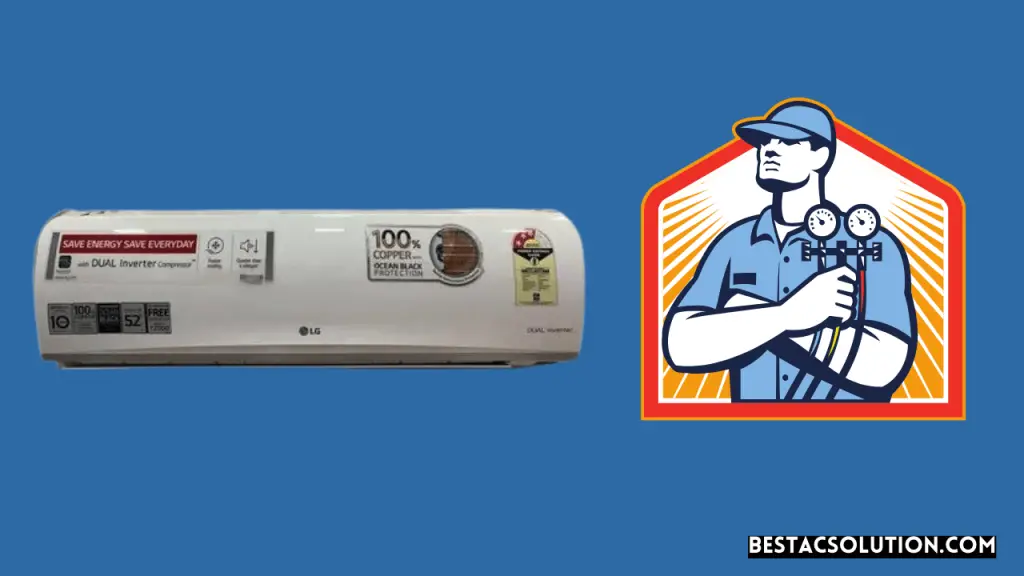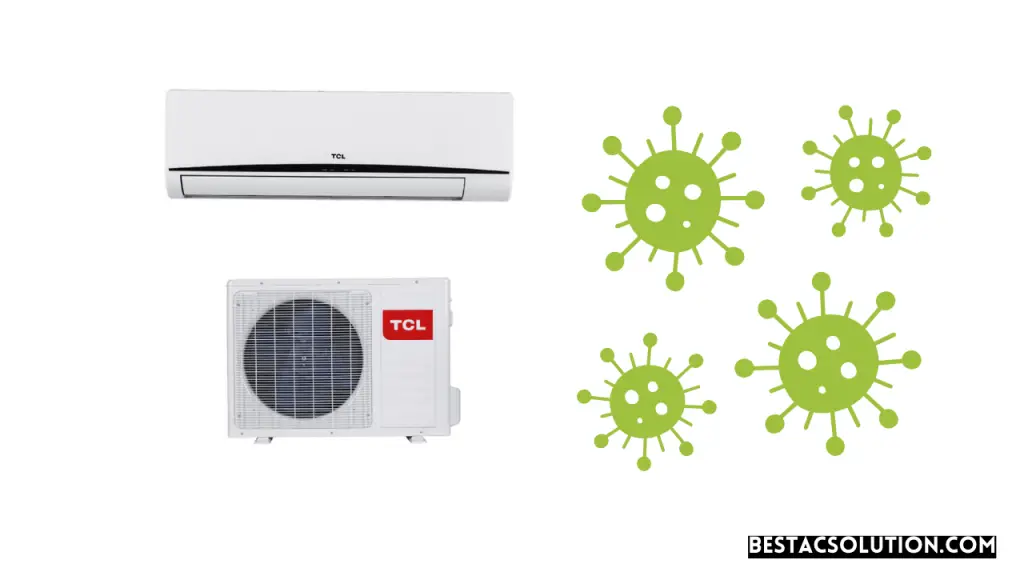Water leakage from a split AC can be caused by dirty air filters, incorrect installation, leaking refrigerant, piled up mold and fungus, or old pipes.
Dirty Air Filters
One of the main reasons for water leakage from a split AC is dirty air filters. Air filters are easy to get dirty, inhibiting the proper flow of air and causing various issues with the AC unit. When the air filters become clogged with dirt, dust, and debris, the airflow is restricted, which leads to reduced cooling efficiency and excess condensation buildup.
Air filters are easy to get dirty
Air filters in a split AC are designed to capture dust and other pollutants from the air, ensuring clean and fresh air circulates indoors. However, over time, these filters can accumulate dirt, pollen, pet dander, and other airborne particles, causing them to become dirty and clogged. Environmental factors such as high levels of air pollution, construction activities, and excessive dust and debris in the surrounding area can accelerate the dirt accumulation process.
Dirty air filters can cause water leakage
When the air filters are dirty, they obstruct the smooth flow of air through the AC unit. As a result, the evaporator coils may freeze up due to insufficient warm air passing by them. When the evaporator coils freeze, excess condensation is formed as the moisture in the air coming into contact with the coils freezes and then melts. This excess condensation can overflow the drain pan and result in water leakage from the split AC.
To prevent water leakage from a split AC caused by dirty air filters, it is important to regularly clean or replace the filters. Cleaning the filters using a vacuum cleaner or washing them with water and mild detergent can help remove the dirt and improve the airflow. It is recommended to clean the filters at least once every month, or more frequently if you live in a dusty or polluted area. By doing so, you can ensure the proper functioning of your split AC and reduce the risk of water leakage.
In addition to cleaning the air filters, it is also necessary to schedule regular maintenance for your split AC. A professional technician can inspect and clean the internal components of the AC unit, including the evaporator coils, condensate drain line, and drain pan, to prevent any blockages or clogs that can contribute to water leakage. By taking these preventive measures, you can enjoy efficient cooling without the hassle of water leakage from your split AC.
Incorrect Installation
One of the main reasons for water leakage from a split AC is incorrect installation. When a split AC is not installed properly, it can result in various issues, including water accumulation and leakage. Here are some common examples of incorrect installation that can lead to water leakage:
- Improper positioning or alignment of the AC unit: When the split AC unit is not positioned correctly or aligned properly, it can cause water to accumulate in certain areas of the unit. This can result in water leakage from the AC.
- Blocked or clogged drainage pipes: During the installation process, it is crucial to ensure that the drainage pipes are not blocked or clogged. If the drainage pipes are obstructed, it can prevent the smooth flow of water, leading to water leakage from the split AC.
- Inadequate insulation: Proper insulation is essential to prevent water leakage from a split AC. If there are gaps or insufficient insulation around the AC unit, it can cause condensation to form and eventually result in water leakage.
- Loose or faulty connections: Another common issue during installation is loose or faulty connections between various components of the split AC system. If there are any leaks or loose connections, it can lead to water leakage from the unit.
- Incorrect placement of the drain pan: The drain pan is responsible for collecting condensate water and directing it towards the drainage pipes. If the drain pan is not placed correctly or is not sloped properly, it can cause water to accumulate and eventually lead to leakage.
Proper installation of a split AC is crucial to prevent water leakage. It is recommended to hire a professional technician who has experience in installing split AC units correctly. A professional will ensure that all components are installed accurately, including proper positioning, alignment, insulation, and connection. By investing in a proper installation, you can avoid the inconvenience and potential damage caused by water leakage from your split AC.
Leaking Refrigerant

Leaking refrigerant can cause water leakage from the split AC.
Leaking Refrigerant:
The refrigerant in a split AC system is responsible for cooling the air. However, when there is a leak in the refrigerant, it can lead to excess condensation and water accumulation. This can result in water leakage from the split AC unit, causing a mess and potentially damaging your home or office.
There are several reasons why the refrigerant may be leaking. It could be due to a damaged or worn-out refrigerant line, a faulty valve or connector, or even poor installation. Whatever the cause may be, it’s important to address the issue promptly to prevent further damage.
To determine if your split AC is leaking refrigerant, there are a few signs to look out for. One common indicator is a sudden decrease in cooling efficiency. The AC unit may struggle to maintain the desired temperature, leading to discomfort and increased energy bills.
Another sign of refrigerant leakage is the presence of ice or frost on the evaporator coil. This happens when the refrigerant levels are low, causing the coil to freeze over. As the ice melts, it can drip water and lead to leakage.
If you suspect that your split AC is leaking refrigerant, it’s crucial to call a professional HVAC technician to inspect and repair the unit. Attempting to fix the issue yourself can be dangerous and may result in further damage.
Once the refrigerant leak is identified and fixed, the excess condensation and water accumulation should subside. However, it’s important to remember that prevention is always better than cure when it comes to split AC maintenance.
Regularly servicing and maintaining your split AC can help prevent refrigerant leaks and other issues. Change the air filters as recommended by the manufacturer to ensure optimal airflow and prevent debris from clogging the system. Additionally, keep the AC unit clean and free from dust and dirt that can hinder its performance.
In conclusion, a refrigerant leak can be a significant cause of water leakage from a split AC unit. Addressing this issue promptly by contacting a professional HVAC technician is essential to prevent further damage and ensure the optimal performance of your split AC system.
Piled Up Mold And Fungus

Mold and fungus can accumulate in the AC unit over time. This can happen due to various factors such as high humidity levels, poor ventilation, and lack of regular maintenance. When mold and fungus start to grow, they can cause serious issues, including clogged drainage pipes and water leakage.
The presence of mold and fungus can result in clogged drainage pipes, leading to water leakage.
Mold and fungus thrive in damp and dark environments, making the AC unit an ideal breeding ground. As these microorganisms grow, they can obstruct the drainage pipes, preventing water from flowing freely. When the drainage pipes are clogged, the condensate water produced by the AC unit has nowhere to go and starts to leak out.
Furthermore, mold and fungus can form a slimy layer on the internal parts of the AC unit, including the evaporator coil and fan blades. This layer not only obstructs the airflow, but it also traps moisture, leading to the accumulation of condensation. If the condensation is not properly drained, it can contribute to water leakage.
It is essential to regularly clean and maintain the AC unit to prevent the buildup of mold and fungus. This can be done by regularly changing the air filters, ensuring proper ventilation, and scheduling professional maintenance. Additionally, using anti-fungal treatments or installing UV light systems can help inhibit the growth of mold and fungus.
Conclusion
Piled up mold and fungus in the AC unit can be a major cause of water leakage. By understanding the risks associated with mold and fungus growth, and taking preventive measures, such as regular cleaning and maintenance, you can ensure that your split AC functions efficiently and avoids water leakage issues.
Old Pipes
In the case of a split AC, old pipes can be a reason for water leakage. Over time, the drainage pipes in a split AC can wear out and become old. These pipes are responsible for draining the condensation formed when the AC cools the air. If these pipes develop cracks or holes due to wear and tear, they can cause water leakage.
Over time, the drainage pipes in a split AC can wear out and become old.
As the split AC operates and continuously cools the air, the moisture in the air condenses and needs to be drained. The drainage pipes in the AC system are responsible for carrying this condensation away from the AC unit. However, over time, these pipes can deteriorate and become old. This can happen due to various factors such as exposure to harsh weather conditions and regular use of the AC. When the pipes become old, they are more prone to developing cracks or holes, leading to water leakage.
Old pipes may develop cracks or holes, causing water leakage.
When the drainage pipes in a split AC become old, they may develop cracks or holes. These cracks or holes can occur due to corrosion, pressure, or general wear and tear. As a result, when the AC unit is operational, the condensation formed inside the unit may not be properly drained and instead start to leak through these openings in the pipes. This can lead to water leakage from the AC unit.
To prevent water leakage from old pipes in a split AC, regular maintenance and inspections are essential. It is recommended to have a professional HVAC technician inspect and replace any old or damaged drainage pipes to ensure proper functioning of the AC unit and prevent water leakage.
Frequently Asked Questions

How Do I Stop My Split Ac From Leaking?
To stop your split AC from leaking, follow these steps: 1. Check and clean your air filters regularly. 2. Ensure correct installation of the unit. 3. Check for leaking refrigerant and get it repaired. 4. Regularly clean and remove any mold or fungus buildup.
5. Check for any old or damaged pipes and replace if necessary. By following these guidelines, you can prevent leakage from your split AC.
Why Is My Split Ac Leaking Water?
If you notice water leakage from your split AC, it could be due to various reasons such as dirty air filters, incorrect installation, leaking refrigerant, piled up mold and fungus, or old pipes. Identifying the cause will help you find the appropriate solution to prevent further leakage.
What Could Cause A Split System Air Conditioner To Leak Water?
There are several potential factors that can cause water leakage from a split system air conditioner. Some common causes include a clogged drain line, dirty air filter, frozen evaporator coil, broken drain pan, high humidity, or refrigerant leakage. Identifying the specific cause will help you resolve the issue effectively.
How Do I Stop My Split Ac From Leaking?
To prevent water leakage from your split AC, you can take certain measures. Ensure that the air filters are clean and free from dirt and debris. Make sure the installation of the AC unit is done correctly. Regularly inspect and clean the evaporator coil.
If the issue persists, it is recommended to seek professional assistance to diagnose and fix the problem properly.
Conclusion
To prevent the hassle of constantly cleaning up water leaks, it’s essential to understand the reasons behind the issue and find effective solutions. Dirty air filters, incorrect installation, leaking refrigerant, piled-up mold and fungus, and old pipes can all contribute to water leakage from a split AC.
By addressing these issues promptly, you can maintain a properly functioning AC system and prevent water leaks in the future. Keep your home comfortable and dry by taking the necessary steps to solve this common problem.


